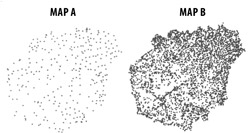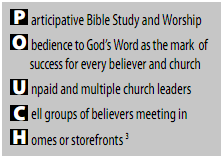From the article found here -> Can Short-Term Teams Foster Long-Term Church-Planting Movements?
The Greatest Blessing Is to Train Others to Start Churches

As the overcrowded and under–maintained bus slowed to pick up a passenger on the rural Asian road, an older woman stepped out of the bushes. The bus struck her and knocked her 20 feet, killing her instantly. A small boy and girl, probably her grandchildren, fell on her body weeping. Curtis Sergeant, a strategy coordinator for the International Mission Board of the Southern Baptist Convention, witnessed this from the back of the bus. He was with a national friend and they were about five hours into their ten-hour journey across the province that was to be his new mission field.
Sergeant was pained, but having spent years in less developed countries, had seen such accidents before. But what happened in the next few minutes shook him and caused him to grieve in his heart.
It wasn’t even that the bus driver spit on the body and cursed the grandmother for denting his bus. Sergeant, too far back to be able to exit to offer assistance, said to his companion, “You have to tell the bus driver to stop.” “Why?” the friend puzzled. “Because those children there are all alone, and someone needs to do something to help them.” Then his companion spoke the truth about the people in this mission field that caused even this veteran missionary to question God’s wisdom in sending him there. “Everyone on this bus has enough troubles of their own.” So the bus rumbled down the road.
Anger welled up inside him. “Lord, why did you send me to this place of heartless, evil people?” And the answer, spoken to his heart, came back: “That’s why I sent you. The people have no hope, no purpose, nothing to give. I sent you so that they would.” Sergeant sighs as he tells the story today, “People’s hearts were hopeless.”
This incident took place in 1991. For the next five years, Sergeant worked strategically in this province, and saw his efforts wonderfully blessed by God as a great church planting movement began in this area. A Church-Planting Movement is sometimes defined as “a rapid multiplication of indigenous churches planting churches that sweeps through a people group or population segment.”1 Even though this was a restricted-access country, much was brought together by God in the province to cause exponential growth of churches over the next several years. An important factor was the structure of the local churches themselves that facilitated multiplication. Sergeant and others who would join him in this movement also intentionally and tactically used short–term mission teams to kindle the fire.
 How fast and momentous was the growth of this church-planting movement? To grasp the enormity of the task, picture a population the size of New York City, or if you’d rather, Kentucky plus Oregon. What happened over a few years was that a significant, Holy Spirit-powered, church-planting movement caught fire. It was kindled to an important degree by short–term missionaries. Sergeant looked around five years after God used him to begin the work, saw that he was no longer needed there, and went on to his next calling. That was far from the end of the story, however.
How fast and momentous was the growth of this church-planting movement? To grasp the enormity of the task, picture a population the size of New York City, or if you’d rather, Kentucky plus Oregon. What happened over a few years was that a significant, Holy Spirit-powered, church-planting movement caught fire. It was kindled to an important degree by short–term missionaries. Sergeant looked around five years after God used him to begin the work, saw that he was no longer needed there, and went on to his next calling. That was far from the end of the story, however.According to David Garrison in his book, Church Planting Movements, Sergeant began with only three house churches numbering 85 members. To his knowledge, although there were a few government-sanctioned churches that they avoided, there were no other followers of Jesus in the province. The first year, six churches were planted. The next year, they started 17, then 50. Sergeant remained until 1996. By the time he left, the province had about 8,000 followers of Jesus. God’s blessing on the national church’s growth had taken them to every county in the province, all five ethnic groups, and were beginning to saturate the entire province. The rest of the team from the Southern Baptist IMB was gone by 1998. By that time, there were 550 house churches, numbering more than 55,000 believers in the province. Map A shows the growth between 1993 and 1998. Each dot represents a church. By 2001, it is estimated that there were 900 churches with nearly 100,000 believers worshipping in them. By 2005, as seen in Map B, one might wonder if there was any area left without a church within walking distance. This all took place in a country that if not closed to the gospel, certainly had a government that was hostile to non–sanctioned churches.
What factors and actions led to that growth, and to the further exponential growth continuing to this day? Sergeant lists several:
Short–Term Volunteers: Because the province and its people groups included so few Christians, an important church-planting tactic was to use short–term missionaries recruited from other countries. Although they did not speak the predominant language of the province, they were able to speak a shared language with many people in the county seats. These short–term missionaries came from several different countries. They appeared as if they were from the same general ethnic group as the population, and so did not draw attention to themselves because of their low profile.
A Person of Peace: First, they would seek out a person of peace in each new community. That person may or may not have been a believer initially, but could help facilitate a house church. The first church then began with an emphasis on discipleship. Then Sergeant would connect with leaders and tie them into a network of other house churches.
The Significant Advantage of Short–Term Missionaries: There was no temptation to develop dependence on outsiders, because they knew the visitors wouldn’t be there that long. “After all, Paul was essentially a short–term missionary,” Sergeant reminds us. “Except for longer stays in Corinth and Ephesus, he was not ministering anywhere very long.”
Training the Trainers: Sergeant led the short–termers to spend much of their time training nationals who would in turn train others. The nationals would be trained in a central location. When they left to return to their own town or a new village, they would then train others. The locals absorbed the training, sponge–like, because they knew from the beginning that it was their own individual and community responsibility to obey Christ’s commands and impart those to others. Picture the urgency on the faces of the national believers as they responded to the training. Sergeant shares how training, leadership and spiritual growth are all tied in together. “The heavenly economy is different from the earthly economy. As I am faithful in leading others, He will reveal more of himself to me. It’s all based on giving, not on protecting what I have. Keeping people from leading is the last thing you want to do. Everyone is a contributor, not just a consumer. Prayer, Bible study, life in the Body, persecution and suffering.” We’ll talk more about exactly how new believers were prepared for sharing their faith in a moment.
 Start with Accountability: Sergeant is often asked how the church’s theology could remain solid with such fast growth. He asserts that it has to do with the way the churches function. They have dual accountability. Every time the members get together they are asked two questions: (1). Did you apply what you learned? (2). To whom have you passed this teaching, and how have they applied it? According to Sergeant, this keeps them tied to the Lord and accountable. Scripture is the authority, and there is a twin focus on right belief and right behavior in daily life. Both orthodoxy and orthopraxy (from the Greek “orthopraxia”, meaning correct action/activity) are important, whereas in more traditional churches we have become a bit skittish at questioning other believers about their conduct. “In movements that are this active, you don’t have to worry about orthodoxy, because it’s being constantly tested.” The network itself has very high accountability. The individuals are accountable to their local church. The church is then accountable to the district, which is accountable to the county leadership, which is further accountable at the province level.
Start with Accountability: Sergeant is often asked how the church’s theology could remain solid with such fast growth. He asserts that it has to do with the way the churches function. They have dual accountability. Every time the members get together they are asked two questions: (1). Did you apply what you learned? (2). To whom have you passed this teaching, and how have they applied it? According to Sergeant, this keeps them tied to the Lord and accountable. Scripture is the authority, and there is a twin focus on right belief and right behavior in daily life. Both orthodoxy and orthopraxy (from the Greek “orthopraxia”, meaning correct action/activity) are important, whereas in more traditional churches we have become a bit skittish at questioning other believers about their conduct. “In movements that are this active, you don’t have to worry about orthodoxy, because it’s being constantly tested.” The network itself has very high accountability. The individuals are accountable to their local church. The church is then accountable to the district, which is accountable to the county leadership, which is further accountable at the province level.Duckling Discipleship: Another question that Sergeant often hears is, “What about leadership, with so few people formally trained, or even having been Christians very long?” His answer might cause a smile. “When you see a family of ducks crossing the road, only the first duckling is following the mother. The rest are following the duckling in front of them.” Sergeant explains. “None of us has achieved the full measure of the stature of Christ. Every one is mature enough to be a leader of another duckling. Follow me as I follow Christ.” That’s a lot of responsibility on new believers, but they seem up for it. “Each of us, including a brand new follower, is ready and responsible to lead others to Christ. Everything we receive, we have an obligation to pass on to others.”
 The churches tended to be small. Seldom did a house church grow much larger than 30 members before it spun off a sister church. This splitting accomplished two beneficial results: it avoided attracting government attention, and it caused faster growth. A good summary of the structure of these house churches is to look at the acronym Sergeant developed, POUCH churches.
The churches tended to be small. Seldom did a house church grow much larger than 30 members before it spun off a sister church. This splitting accomplished two beneficial results: it avoided attracting government attention, and it caused faster growth. A good summary of the structure of these house churches is to look at the acronym Sergeant developed, POUCH churches.The POUCH Church
Is this a one–place, one–time kind of miracle by God for which we ought to sit back in wonder and praise Him? Or is it a wonderful miracle, plus a basket of lessons for us to apply? Dan Hitzhusen, International Vice President of the mission organization e3 Partners, offers a view into how short term mission groups have learned from this and continued the POUCH church idea. He says that short–term missionaries can be very effective in coming alongside nationals in church planting. While recognizing that sometimes poorly planned team efforts can do more harm than good, he lists several ways they can help when done right:
Short–term teams can open doors for nationals. Their very novelty can create interest. Some short–term missionaries explain, “We’re just the bait! Once the door is open, the nationals walk right in.”
Short–term teams can be used by nationals to plow up difficult ground with prayer. More than one short–term mission team has spent their time prayer–walking through unreached or difficult areas. Nationals are encouraged by the fact that someone would come from so far away to show love for their country. And God answers their prayers.
They can use their God–given gifts and talents. They can be used in evangelism, storytelling (even through translators), and sports ministries.
They can train. Perhaps most significantly for the province that experienced such wonderful growth, they can be a source of training for nationals. Although it was a country essentially closed to missions, Christian visitors were able to move in and out to help train the trainers. In the first year, four teams of 4–10 members came ten times. They trained nationals to plant 11 churches, strategically placed in different counties, in the first year. Was it really the trained nationals who were doing the work year after year? Hitzhusen offers a striking piece of evidence. Commenting on how inconspicuously Curtis Sergeant worked during his years there, he says, “When he left, probably only about 20 people in the province even knew his name!”
They can model POUCH Groups.
Believers (sometimes joined by seekers) can take part in these groups at home, and then become comfortable with the concept and the accountability involved as they help in church-planting. Ideally, each believer is involved in two groups: the one in which he or she is a participant, and a new one that he or she is starting. In a church-planting movement, much the same thing happens.
Sounds good, but in the fast-growing church-planting movement in Sergeant’s province, what really happened at ground level? How quickly were new believers expected to share their faith and even plant churches? Immediately! As soon as someone came to Christ, Sergeant or one of his team members would say the following: “It is a great blessing to lead someone else to Christ. It is an even greater blessing to start a church. It is the greatest blessing to train others to start churches. I want you to have the greatest blessing, but let’s start with great blessing.” Then together, they would make a list of 100 friends and begin to role-play sharing the Gospel with five friends. Then they would pray and go and share with their five friends right away. After that new believer came to Christ, he or she would repeat the same phrases. Many wouldn’t really know how to plant a church yet, but they would learn over time as one duckling follows the other. One disciples another who may be only one step behind.
So then, could this be replicated? The evidence of growth like this in other areas that apply these strategies gives a resounding, Yes! Sergeant, now the Vice–President for Global Strategies with e3 Partners, has worked with the same system in other countries with results that evidence God’s blessing. E3 Partners has taken much of this, and worked with short–term teams to come alongside church planters in many other countries. In India, a mission called Light India has begun, whose purpose is to see thousands of new churches started in every state of India using this strategy. Curtis Sergeant has stated that heaven’s economy is different from the world’s economy. How about this: The average cost to train and provide materials to start each new church in Light India is only $13.
 E3 Partners has also combined the experience of Pouch churches with modern technology and media experience through their I Am Second ministry. Originally begun as an evangelistic effort in the Dallas/Ft. Worth Texas area in 2008, it has gone world-wide as both an outreach and a training resource. I Am Second Groups are a version of POUCH churches, and include an Internet overlay. This resource has been a useful source of training for the church-planting movement. The visible face of the ministry is a website www.iamsecond.com, which has striking and unusual filmed testimonies by people, some well–known, others more like your next-door neighbor. Bethany Hamilton, subject of the film Soul Surfer, shares her faith. St. Louis Rams quarterback Sam Bradford is on it, as is Texas Ranger Josh Hamilton talking about his recovery from addiction. Others discuss how God has rescued them from a myriad of conditions, from abuse to war. The site offers opportunities for seekers or strugglers to call, chat or email for help. People are attracted by the testimonies, and invited to consider giving their lives to the Lord. It is a great tool to use to lead seekers to Christ in urban areas that have Internet connections.
E3 Partners has also combined the experience of Pouch churches with modern technology and media experience through their I Am Second ministry. Originally begun as an evangelistic effort in the Dallas/Ft. Worth Texas area in 2008, it has gone world-wide as both an outreach and a training resource. I Am Second Groups are a version of POUCH churches, and include an Internet overlay. This resource has been a useful source of training for the church-planting movement. The visible face of the ministry is a website www.iamsecond.com, which has striking and unusual filmed testimonies by people, some well–known, others more like your next-door neighbor. Bethany Hamilton, subject of the film Soul Surfer, shares her faith. St. Louis Rams quarterback Sam Bradford is on it, as is Texas Ranger Josh Hamilton talking about his recovery from addiction. Others discuss how God has rescued them from a myriad of conditions, from abuse to war. The site offers opportunities for seekers or strugglers to call, chat or email for help. People are attracted by the testimonies, and invited to consider giving their lives to the Lord. It is a great tool to use to lead seekers to Christ in urban areas that have Internet connections.At other locations on the site are invitations to begin or join an I Am Second group, patterned on the POUCH church idea. Deeper in the website are also Bible studies, with questions that are used in the groups and new churches. Training materials are also available on this one site, which are now being used worldwide. All of this comes together for the purpose of being a resource to believers, trainers and new church plants. Call it an online site to spark an offline movement.
You’ve probably heard the story of the little boy whose father wanted to teach him the power of multiplication. The man asked his son whether he would have more money if he received $1.00 a day for 30 days, or a penny the first day, two pennies the next, and so forth, each day receiving double the day before. It seemed to the little boy that the addition of $1.00 every day would yield him more than starting with just a penny and doubling that daily. The real answer, to his astonishment, is that doubling the penny daily would yield a haul on the last day of over $10 million. People are much more than pennies, but God’s economy is also one of multiplication rather than simple addition. And Jesus talked of seeds each multiplying “a hundred–fold.”
In 2010, Curtis Sergeant was visiting his friend Thom in India. It had been 19 years since the bus incident, and 14 years since Sergeant left the province of that East Asian country. A Christian woman came to their door, very excited. “I’ve got to tell you about this place I visited. It was amazing! Every village has churches. The worship is phenomenal. They’re sending out missionaries! The government formerly persecuted the Christians, and now they are encouraging churches because the crime rate is down.” Thom asked, “Where is this place?” Sergeant smiled when she named the same province in which God had used him so many years back—the province that less than one generation before had been, a place of “heartless, evil people” with no hope in their hearts.
No comments:
Post a Comment